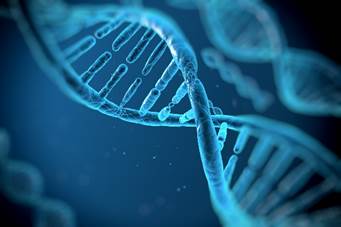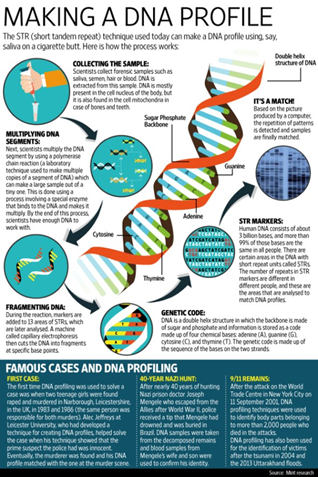
Disclaimer: Copyright infringement not intended.
Context
- Supreme Court has voiced concerns over their increasing use of DNA Testing to prove a case but women’s rights activists deem the technology an empowering tool.
Genetic testing
- Genetic testing, also known as DNA testing, is used to identify changes in DNA sequence or chromosome structure. DNA is the genetic material in our cells that serves as the blueprint for our unique features. It carries the instructions that enable our body to perform various functions.

Advantages of Genetic Testing
Early prevention and treatment of disease
- As with any disease, early diagnosis of the disease will greatly help in faster treatment. The results of genetic testing can also help healthcare provider in predicting the likelihood and deciding about the management of the disorder. In addition, the results of the test can also help one to learn more about the genetic disease and how it may possibly affect them and their relatives as well.

Can determine parenthood
- Genetic tests can be helpful in establishing evidence for the parenthood of a person for a case like child custody and support. The results of genetic test can also be used as a support for placing a parent’s name on the birth certificate of a child. DNA testing is used for settling disputes in child custody laws.
Can examine developmental delays in children
- It is helpful is determining and interpreting developmental delays in children. Reasons for significant lags in physical, mental, and emotional growth can be determined.
- Also, if a woman has two or more miscarriages or pregnancy over age 34, genetic testing will be helpful for early diagnosis which can help identify the appropriate treatment options.
Useful in Criminal Justice System
- The process of matching a suspect’s DNA with DNA found at a crime scene has provided both law enforcement agencies and court officials with a higher probability of ascertaining the identity of offenders.
- DNA fingerprinting has been very useful for law enforcement, as it has been used to exonerate the innocent. Unlike blood found at a crime scene, DNA material remains usable for an endless period of time.
- The DNA test has a 99.99 % chance of correct conclusions and is perceived as an objective scientific test which may be difficult for an individual to refute.
In a nutshell,
- Direct-to-consumer genetic testing promotes awareness of genetic diseases.
- It provides personalized information about our health, disease risk, and other traits.
- It helps be more proactive about our health.
Women’s rights activists, hold that a DNA test is the only tool which can deliver justice in cases of abandonment of mothers and children.
Disadvantages & Limitations of Genetic Testing
Genetic Discrimination
- Genetic discrimination is the condition wherein a person feels and gets discriminated due to the fact that he/she possesses a genetic abnormality that increases the chances of him/her developing a certain genetic disorder. The possibility of genetic discrimination in employment or insurance is a concern.
Genetic Privacy
- Genetic privacy may be compromised if testing companies use genetic information in an unauthorized way or if data is stolen.
Misleading
- Unproven or invalid tests can be misleading. There may not be enough scientific evidence to link a particular genetic variation with a given disease or trait. People may make important decisions about disease treatment or prevention based on inaccurate, incomplete, or misunderstood information from their test results.
Lack of oversight
- There is currently little oversight or regulation of testing companies.
Stressful
- Unexpected information that one receives about one’s health, family relationships, or ancestry may be stressful or upsetting.
Not full proof
- Although very accurate, it is not 100% foolproof. A partial DNA profile (one that is not complete), for example, may match with multiple people and should not serve as conclusive evidence.
Miscarriage of Justice
- DNA can also be abused, misused, or misunderstood, causing miscarriages of justice. In 2011, a careless lab error resulted in an innocent man being charged with rape because his DNA was erroneously found to match a sample taken from the victim. It later became clear that the lab had mixed up its files.
Precedents set by court
- Precedents set by the Supreme Court through the years show that judges cannot order genetic tests as a “roving enquiry” ( Bhabani Prasad Jena, 2010) and they must balance “the interests of the parties” ( Banarsi Dass, 2005).
- DNA tests should also not be ordered if there was other material evidence at hand to prove the case. In its Ashok Kumar judgment in 2021, the court said judges, before ordering a genetic test, should examine the “proportionality of the legitimate aims” being pursued. DNA tests cannot be ordered as a “matter of course” merely because they are permissible in law.
Ethical Framework
- Conducting research on human subjects essentially involves certain binding ethics and standards to be followed in a humane and culturally sensitive manner. The Declaration of Helsinki, 1964 contains 32 principles, which stress on informed consent, confidentiality of data, vulnerable population and requirement of a protocol.
- The Universal Declaration of Human Rights 1948 expressed concern about rights of human beings against involuntary maltreatment.
- The International Covenant on Civil and Political Rights, 1966 (ICCPR) has provided that “No one shall be subjected to torture or to cruel, inhuman or degrading treatment or punishment. In particular, no one shall be subjected without his consent to medical or scientific treatment.
- In the year 1980, Indian Council for Medical Research released a document called “Policy Statement on Ethical Considerations involved in Research on Human Subjects”
Various Committees
- The P. Shah Committee Report: suggested that there should be safeguards to prevent illegal collection and use of DNA data; further providing safeguards to prevent the proposed body from misusing the same. That there should a mechanism using which citizens can appeal against the retention of data. The report also suggested that there should also be a mechanism of appeal under which citizens under trial can request for a fresh sample to be taken.
- Malimath Committee: recommended amendment of CrPC conferring all criminal courts at all levels with the inherent power to pass appropriate orders, Maintenance of strict confidentiality with regard to keeping of records of DNA profiles and their use.
- Law Commission: The salient features of the recommendations are as below:
(a) DNA Profiling Board as a statutory body.
(b) DNA profiling would be undertaken exclusively for identification of a person and would not be used to extract any other information.
(c) DNA Data Bank.
(d) With a view to assist the kith and kin of missing persons, provisions have been made for proper identification of missing persons on the basis of their bodily samples/substances.
(e) Appropriate regulations may be notified by the Board for entry, retention and expunction of DNA profiles.
(f) Maintenance of strict confidentiality with regard to the keeping of records of DNA profiles and their use.
(g) Sharing of DNA profiles with and by foreign Government or Government organizations or Government institutions or any of its agencies, for the purpose of this Act.
(h) violators of the provisions would be liable for punishment of imprisonment, which may extend up to three years, and also a fine which may extend up to Rs.2 lakhs.
Conclusion
- DNA Profiling and use thereof involves various legal and ethical issues and concerns are raised and apprehensions exist in the minds of the common man about its misuse which unless protected may result in disclosure of personal information, such as health related data capable of being misused by persons having prejudicial interests, adversely affecting the privacy of the person.
- There is need to have scientific collection of data, maintenance of strict confidentiality with regard to privacy and keeping of records of DNA profiles and their use, safeguards to prevent the illegal collection and use of DNA data, and a need for robust process and structure for collection of DNA samples from the crime scene to the laboratory for analysis, to the DNA Bank for storage and comparison.
- Passage of the DNA Technology (Use and Application) Regulation Bill, 2019 would be a welcome move in this regard.
https://www.thehindu.com/news/national/as-demand-grows-court-mandated-dna-tests-walk-the-fine-line-between-justice-and-privacy/article66073844.ece












